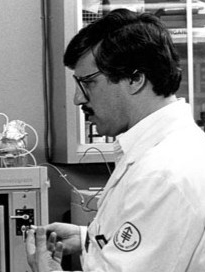| Abstract: |
The mechanism of inhibition of the proliferative response in primary mixed lymphocyte culture (1° MLC) by antibodies to β2-microglobulin (β2m) was investigated. It is demonstrated that anti-β2 antibodies inhibit the production of interleukin 2 (IL 2). In contrast, the expression of IL 2 receptor is not affected by anti-β2m. The addition of purified exogenous IL 2 to the antibody-treated 1° MLC can completely restore the proliferative response, indicating that anti-β2m does not interfere with IL 2 binding to its receptor. Similarly, anti-β2 does not interfere with the capacity of IL 2-dependent T cell lines or T cell clones to respond to exogenous IL 2. The inhibition of cell proliferation and IL 2 production by anti-β2m is maximal when the antibody is added at the beginning of 1and no effect of anti-β2m is seen when added after 3 days of culture. Anti-β2m has no effect on mitogen-induced cell proliferation and IL 2 production. Anti-β2m acts on the responder cell population, as demonstrated in experiments in which responder cells or stimulator cells are treated separately with the antibody. The expression of HLA-Class II antigens (i.e., HLA-DR and DQ (DC) on the T cells activated on 1anti-β2m. These studies indicate that the HLA-β2m class I antigen complex plays a role in T lymphocyte activation via release of IL 2, and suggest the existence of different mechanisms for activation of IL 2 producers and IL 2 responders in 1° MLC. |
| Keywords: |
t lymphocyte; t-lymphocytes; interleukin 2; lymphocyte activation; mixed lymphocyte culture; lymphocyte culture test, mixed; antibodies, monoclonal; kinetics; hla-dr antigens; lymphoma; beta 2 microglobulin; histocompatibility antigens class ii; interleukin-2; human experiment; receptors, immunologic; interleukin 2 receptor; receptors, interleukin-2; binding, competitive; human; priority journal; beta 2-microglobulin; support, u.s. gov't, p.h.s.; blood and hemopoietic system
|




